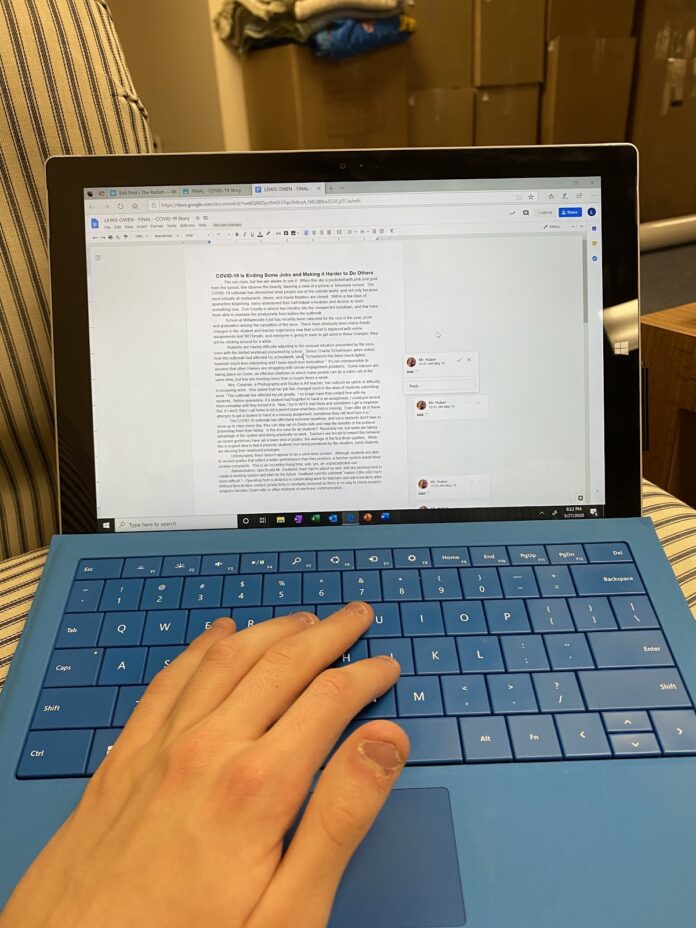By Owen Lewis
The sun rises, but few are awake to see it. When the sky is pocketed with pink and gold from the sunset, few observe the beauty, favoring a view of a phone or television screen. The COVID-19 outbreak has diminished what people see of the outside world, and not only because most virtually all restaurants, stores, and movie theaters are closed. Within a few days of quarantine beginning, many abandoned their half-baked schedules and desires to learn something new. Erie County is almost two months into the unexpected lockdown, and few have been able to maintain the productivity from before the outbreak.
School at Williamsville East has recently been canceled for the rest of the year, prom and graduation among the casualties of the virus. There have obviously been many drastic changes to the student and teacher experience now that school is replaced with online assignments and WITSmails, and everyone is going to have to get used to these changes; they will be sticking around for a while.
It’s not unreasonable to assume that other Flames are struggling with similar engagement problems.
Students are having difficulty adjusting to the unusual situation presented by the virus, even with the limited workload presented by school. Senior Charlie Schatmeyer, when asked how the outbreak had affected his schoolwork, said, “Schoolwork has been much lighter, however much less interesting and I have much less motivation.” It’s not unreasonable to assume that other Flames are struggling with similar engagement problems. Some classes are taking place on Zoom, an effective platform on which many people can do a video call at the same time, but few are meeting more than a couple times a week.
Mrs. Creahan, a Photography and Studio in Art teacher, has noticed an uptick in difficulty in assigning work. She stated that her job has changed most in the area of students submitting work: “The outbreak has affected my job greatly. I no longer have that contact time with my students. Before quarantine, if a student had forgotten to hand in an assignment, I could just remind them everyday until they turned it in. Now, I try to WITS mail them and sometimes I get a response. But, if I don’t, then I call home to let a parent know what their child is missing. Even after all of these attempts to get a student to hand in a missing assignment, sometimes they still don’t turn it in.”
The COVID-19 outbreak has effectively removed deadlines, and since students don’t have to show up to class every day, they can skip out on Zoom calls and reap the benefits of the protocol preventing them from failing. Is this the case for all students? Absolutely not, but some are taking advantage of the system and doing practically no work. Teachers are forced to reward this behavior, as recent guidelines have set a lower limit of grades: the average of the first three quarters. While this is a good idea in that it prevents students from being penalized by the situation, some students are abusing their newfound privileges.
Unfortunately, there doesn’t appear to be a short-term solution. Although students are able to receive grades that reflect a better performance than they produce, a harsher system would likely receive complaints. This is an incredibly trying time, and, yes, an unprecedented one.
Administrators, specifically Mr. Swatland, have had to adjust as well, and are working hard to create a working system and plan for the future Swatland said the outbreak “makes it [his job] much more difficult.”. Operating from a distance is complicating work for teachers and administrators alike. Without face-to-face contact, productivity is inevitably lessened as there is no way to check people’s progress besides Zoom calls or other methods of electronic communication.
Not all jobs are secure, either. There’s little doubt that even those whose jobs are made doubly difficult by the pandemic are still grateful to have them, because many people are being laid off. My father told me that “The company that I work for may lay off as many as 50% of its employees due to the economic downturn. I’ve been lucky so far that my work has been unaffected, but I think over the next six months, it’s anyone’s guess what will happen.” Since the virus hasn’t even peaked in many areas, job security seems all but absent.
Regardless, it’s not time to reopen the area yet. Mr. Swatland said that the way people can do their part to ensure safety for themselves and others is: “Right now, social distancing, when we return to school in the fall, follow all of the new rules that will be put in place.” COVID-19 is dangerous, in some cases lethal, and people have a civic duty to social distance in order to prevent the spread of the virus. The more effectively this is done, the faster the area and world will return to normal. Until then, increased job difficulty is something to expect, and something to get used to.
It’s best to keep distance from others during the outbreak. Try a new project, call your friends, or read a new book!










